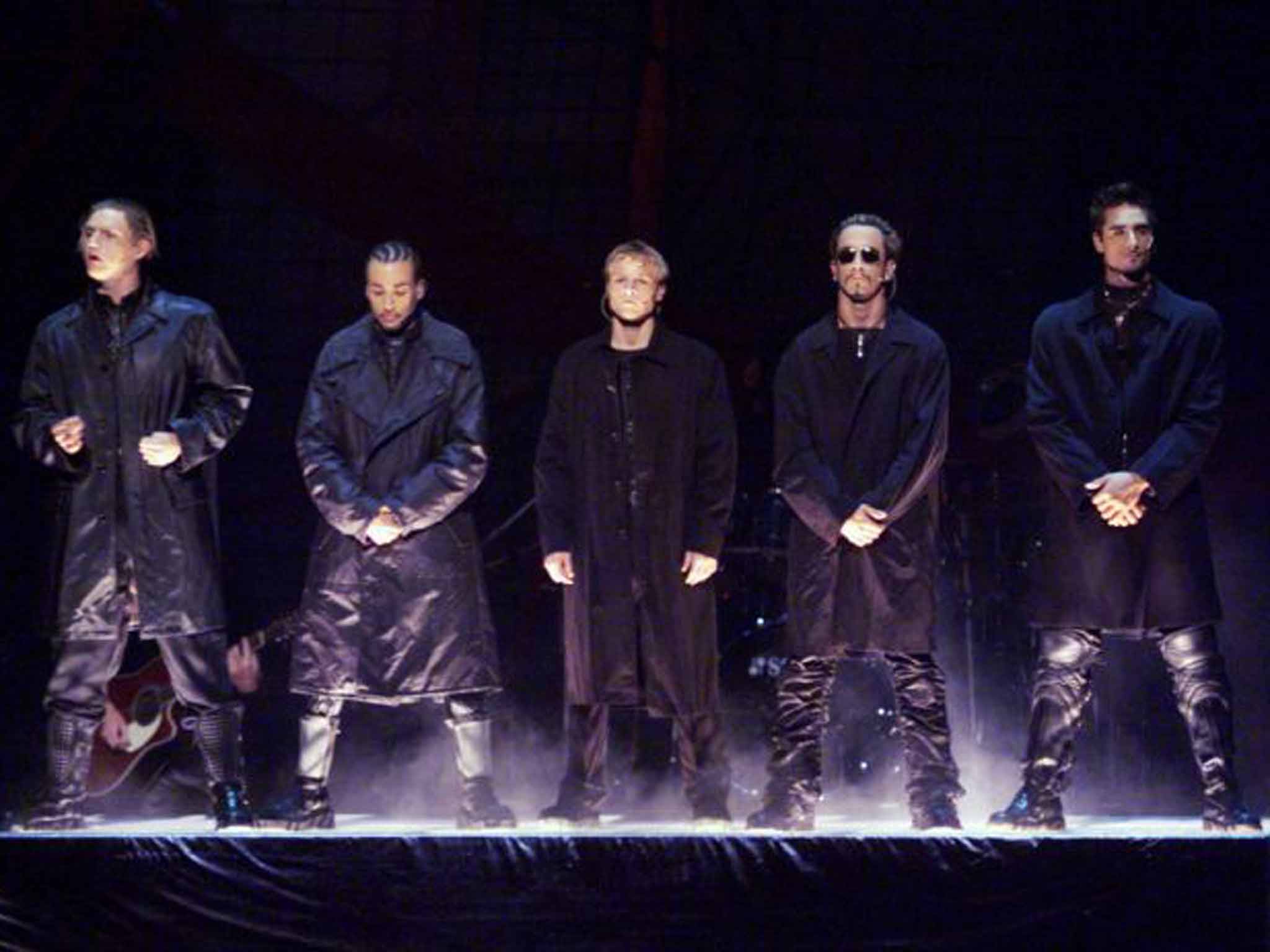New Backstreet Boys movie Show 'Em What You're Made Of gives affectionate look at five middle-aged men
The Backstreet Boys might be middle-aged, married and have dodgy knees, but a heartfelt documentary reveals they're not going gently into pop's good night, says Kira Bindrim

Since their first single 20 years ago, the Backstreet Boys – AJ McLean, Howie Dorough, Nick Carter, Kevin Richardson and Brian Littrell – have recorded a dozen albums and sold more than 130 million of them worldwide. They've packed amphitheatres, broken records and danced shirtless in fake rain. Now, in the middle of their 20th anniversary world tour, BSB are headed to the silver screen with their documentary Backstreet Boys: Show 'Em What You're Made Of.
Which isn't to say that the Backstreet Boys are old, just… mature, almost the antithesis of today's coiffed and tattooed teen heartthrobs, the One Directions and Justin Biebers who are themselves the pink slime of boy bands past.
Gone are the coloured ski goggles, ill-advised hats and oversized hockey jerseys of bygone BSB, replaced by demure button-downs and slightly less ill-advised haberdashery. In a scene filmed at the London house where the group wrote "In a World Like This", Littrell carefully brings Carter a cup of hot tea. Later, he wears an apron while preparing breakfast for the group. During one rehearsal, Richardson takes to the piano wearing – gasp – cargo shorts.
"We were trying to go at this [movie] from a raw, uncensored perspective," Richardson tells me. "We were not trying to make some fluffy promotional piece."
Somewhat surprisingly, they succeeded. While BSB's early fame is undeniable – cut to footage of girls passing out at packed stadium concerts – Show 'Em What You're Made Of is as much about the group's inevitable comedown as it is about their former dominance.
After the runaway success of 1999's Millennium (singles include "I Want it That Way" and "Larger Than Life"), BSB released Black and Blue in 2000 (singles include the criminally underrated "The Call"), a compilation album in 2001 and Never Gone in 2005. Then a fight over McLean's drug abuse led to a rift between him and Richardson. In 2006, Richardson announced he was leaving the band.
McLean, Dorough, Littrell and Carter put out two albums and went on three tours as a foursome, but BSB wasn't the same, and wouldn't be until Richardson rejoined in 2012. (Both McLean and Carter credit Richardson with helping them recover from drug problems, and throughout the movie and our interview, he comes across as the group's voice of reason.)
"If you're going to do a real documentary, you have to ignore the cameras," McLean says when I ask whether the guys had a discussion about how much BSB reality they'd share on-screen. "We've aired our dirty laundry over the past 22 years, from me going to rehab to Brian's surgery [Littrell had open-heart surgery in 1998], but there's a lot that our fans don't know." Carter adds, "We wanted to give our fans another side of us they've never seen before."
Some of that side is hard to watch if you are a fan. In addition to McLean's struggle with addiction, the documentary touches on Carter's fight against drug abuse and his estrangement from his parents, as well as the group's fraud and theft suits against BSB founder/manager – and later *NSync creator – Lou Pearlman (who would eventually be convicted for perpetrating a $300m Ponzi scheme). Midway through the film, an argument over Littrell's ability to perform at concerts – he has what he calls "vocal tension dysphonia", which tightens the muscles around the vocal chords – is aired. Cue Carter and Littrell yelling, "Shut the fuck up" at each other across a conference room.
Enjoy unlimited access to 70 million ad-free songs and podcasts with Amazon Music
Sign up now for a 30-day free trial
Enjoy unlimited access to 70 million ad-free songs and podcasts with Amazon Music
Sign up now for a 30-day free trial
But there's levity, too. Early in the documentary the guys reflect on a high-school performance when they were almost booed off the stage after their PA blew out (with Glee-worthy aplomb, they recover by singing a cappella). And in a later scene, they pop into a ballet class at Carter's former dance school, where the assembled teen girls prove too young to know the "Thriller"-esque choreography from "Everybody (Backstreet's Back)".
In a way, the Backstreet Boys faded into that good pop culture night inconspicuously. Sure, McLean and Carter struggled with addiction, but there was no major BSB flameout, and the reassembled group could have probably lived off royalties and cameos until their pensions kicked in. That the group is bothering still to perform is impressive. That they're recording new music seems almost inconceivable. "Why not just hang it up?" I want to ask. "One of you could do Broadway. Surely there's a BSB opportunity in reality television."
Show 'Em What You're Made Of answers those questions for me. The Backstreet Boys are determined to remain a band, to keep performing and recording, to stay – indefinitely – "the boys". "We don't have a record deal," Carter says, laughing to the camera early in the movie. "It's awesome. It's like starting all over again." Backstreet's back, all right.
'Show 'Em What You're Made Of' is in selected cinemas from tomorrow
© Newsweek
Subscribe to Independent Premium to bookmark this article
Want to bookmark your favourite articles and stories to read or reference later? Start your Independent Premium subscription today.

Join our commenting forum
Join thought-provoking conversations, follow other Independent readers and see their replies